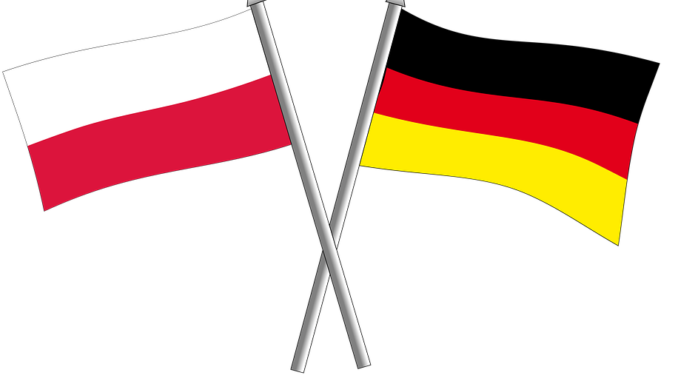
In 2011, Poland’s then Foreign Minister Radosław Sikorski famously stated, “I fear Germany’s power less than her inactivity.” Since then, Berlin and Warsaw’s intensive post-1989 cooperation seems to have ebbed. Why? Can this once-close partnership be reinvigorated?
“Solidarity” and the fall of the Berlin Wall: Poles and Germans become partners
In 1989, few believed Poland would see Germany’s reunification as an opportunity. A powerful Germany had always meant trouble for Warsaw. Within the span of a few short years however, a border agreement was signed, followed by the Treaty of Good Neighborship and Friendly Cooperation, the establishment of the Weimar Triangle format, military cooperation agreements, NATO membership, and ultimately EU accession in 2004.

For the better part of three decades, political, economic, and military cooperation became the new normal, with Berlin and Warsaw shaping the EU’s domestic and external relations. Germany spoke on behalf of “Old Europe” and Poland for “New Europe” — those countries that had shaken off the yoke of communism and were now members of the EU. Today, nearly two million Poles or people of Polish decent live in Germany. Without exception this migration is and continues to be a remarkable success story.
Moreover, few likely know that both countries’ militaries have cooperated in exercises for more than two decades and command mixed Polish-German units. Joined by Denmark, Berlin and Warsaw have established the Multinational Corps Northeast headquartered in Szczecin (Stettin), which now includes eighteen NATO member states. Could any of us have even imagined that in 1989?
Between Brussels, Washington, and Moscow
In recent years however, Polish-German relations have been visibly less intensive. Warsaw has shifted on key political positions in Brussels while attaching ever greater importance to its relationship with Washington and NATO. Berlin, in comparison, remains an EU leader, but it’s no secret relations to the U.S. have been turbulent.
The issue of Russia has been a central challenge. Even before Russia’s illegal annexation of Crimea and invasion of Eastern Ukraine, Warsaw was significantly more concerned about the Kremlin’s aggressive foreign policy. Besides the obvious political and security issues, it was historical experience that informed these concerns. Poles seem to have awoken from their dreaming during the 1990’s after Yelstin’s Russia returned to Soviet-like politics under Putin.
While the German political class emphasizes Russia’s historical experience of the 20th century (e.g. twice invaded by the West), it is astonishing how little regard they have for Poland’s. Whereas Russia has learned to weaponize Germany’s historical sensibilities in order to curb a more robust answer to an aggressive regional policy, Poland’s concerns over being left out of negotiations between Moscow and Berlin (see Molotov-Ribbentrop Pact) are astonishingly downplayed.
This is also why Poland’s and other eastern European countries’ leadership view Nordstream 2 with the utmost concern. Despite Berlin’s insistence that Nordstream is a purely economic project, it is clearly anything but. Rather, it is a geopolitical project that cuts out eastern European states. This neglect of the Polish historical experience is best summed up by a phrase often used in Berlin: “Russia is our neighbour.” Maps say otherwise.
On the Western front, the U.S. administration rightly questions why Germany does not meet its NATO 2% defense spending obligation while making Poland, meeting this goal, a new partner of choice. Germany debates NATO nuclear sharing while Washington threatens to remove troops from German soil and move them to Poland. From Warsaw’s perspective, the more troops the better, but the U.S. has seemingly given Berlin the stick and Warsaw a carrot. Even if Europe’s security will not be adversely affected by Washington’s decision (which remains to be seen), the way the U.S. administration is treating Berlin and Warsaw may put additional strain on the Polish-German relationship.
The differences are clear, but closer cooperation is a must
What also doesn’t make the German-Polish political dialogue easier are two different visions for Europe that both countries are advocating for today. While Warsaw seems to focus on economic cooperation, Berlin would like to see a closer Union based on shared values and political goals. Poland’s voice in Brussels sometimes is understood as if it would like to have the “pleasure” of partaking in the European Union’s financial achievements without the “displeasure” of respecting the rule of law which is fundamental to every democracy.
Despite strategic and political differences, the potential of strong German-Polish bilateral relations cannot be overlooked or downplayed. Two decades of positive cooperation can attest to the transformative power of this relationship. Will efforts made in the 1990s and 2000s be renewed? Will this bilateral relationship build a renewed political architecture within the EU and NATO in an uncertain post-pandemic political reality? Bilateral Poland Germany relations were and, we want to believe, still are equally important today in shaping Europe’s future. Mutually satisfying cooperation between Warsaw and Berlin can help the EU avoid a lot of unnecessary turbulence internally and shape a balanced and effective foreign policy, including its transatlantic dimension and the Eastern Partnership.
* Dr. Remko Leemhuis is Director of the AJC Berlin Office; Dr. Sebastian Rejak is Acting Director of the AJC Central Europe Office
American Jewish Committee (AJC), a global advocacy organization, works to enhance the wellbeing of the Jewish people and Israel and advance human rights and democratic values around the world.

Be the first to comment